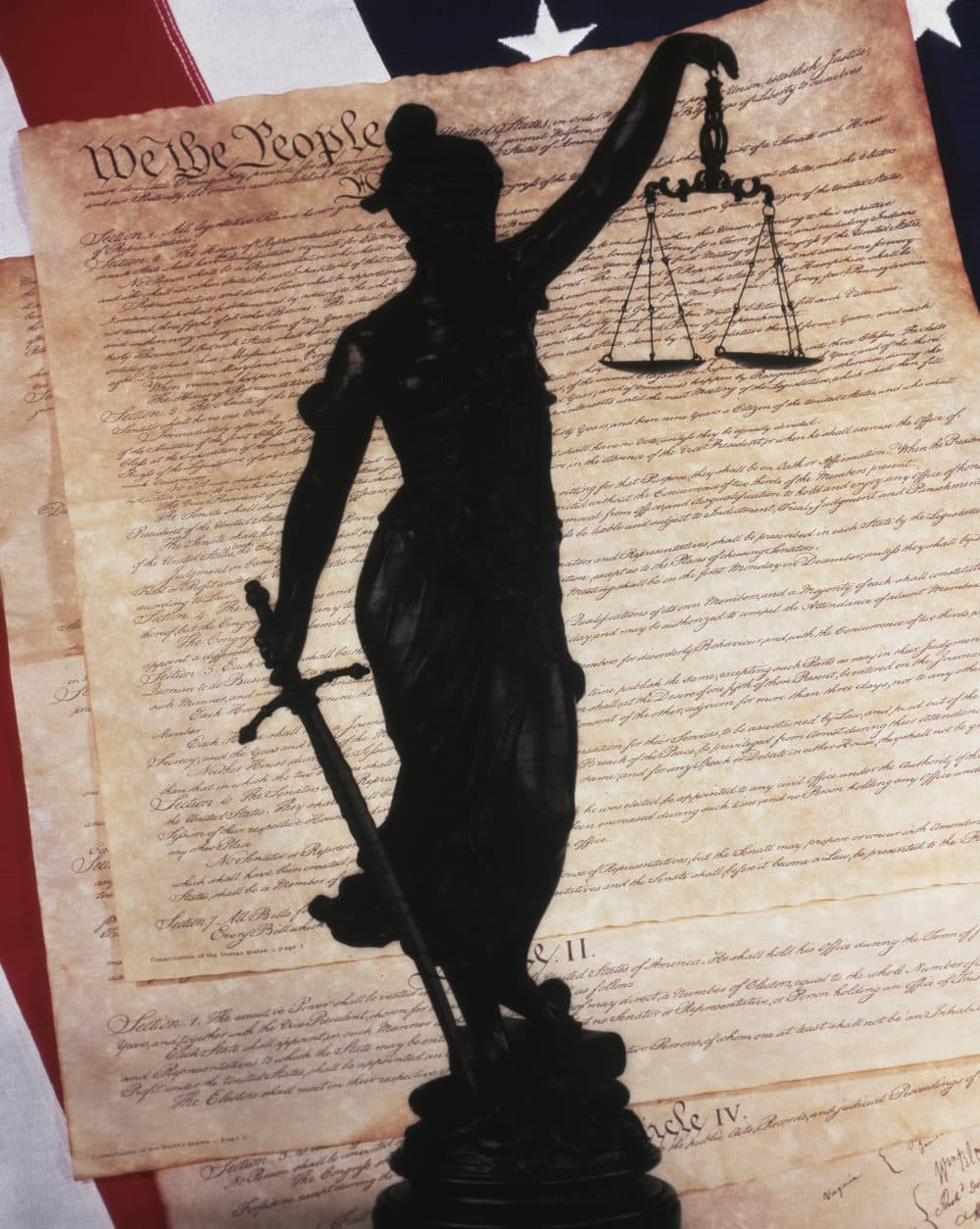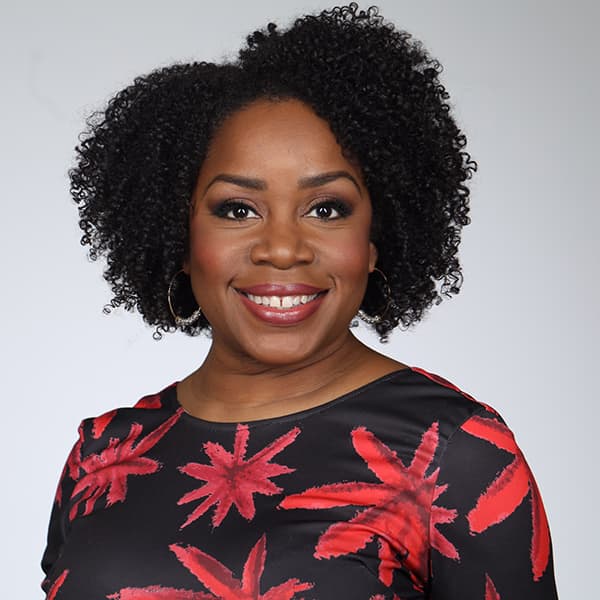Advertisement
In ‘Lady Justice,’ Dahlia Lithwick profiles women who used the rule of law to challenge Trumpism
Resume
When Donald Trump became president, a group of women dedicated themselves to challenging his administration – using the rule of law.
"These women attorneys didn’t sit around workshopping, they just helicoptered in and saved democracy. And I think we forget how much we won."
Journalist Dahlia Lithwick profiles some of those women in her new book Lady Justice … from the birth of Trumpism to the death of Roe v. Wade.
And Lithwick wants her book to play its part.
"I guess I think of it as a blueprint for fighting. But it’s a pink book, I should be clear, so it’s probably a pinkprint."
Today, On Point: Dahlia Lithwick and “Lady Justice.”
Guests
Dahlia Lithwick, senior editor for Slate. Author of “Lady Justice." Host of the “Amicus” podcast, a show about the law and the nine Supreme Court justices who interpret it. (@Dahlialithwick)
Interview Highlights
The book profiles the women lawyers and judges at the center of the political ballot battles of the Trump administration. What inspired you to write this book?
"It was women in law that inspired me. I think there's been many, many, many books about Trump and law, about Trump and politics, about law. And I think I wanted to build a little bit of what seemed to me a pretty evident bridge between what I see as a kind of special relationship or special connection between women and the law, and the rule of law and the necessity of law.
"And so I wanted to really think about — and I don't know if I'm correct about this — if there are ways in which particularly the women lawyers in the book who I profile, who really all were kind of a bulwark against lawlessness and continue to be a bulwark against lawlessness, if there's something special going on there. That women rise to or meet the moment in a way using the tools of the law when it feels as though the law itself is fragile."
On a special relationship between women and the law
"This is just me theorizing, but I think there's something kind of remarkable about the fact that if you look at the founding documents, if you look at the constitutional history, women were utterly invisible. I mean, at the founding, they were chattel. They were property. They belonged to their fathers and their husbands, and they were otherwise immaterial. I'm mindful of the fact that Abigail Adams tried to remind her husband as they were drafting the constitution, to remember the ladies. He did not. And ... this becomes material. I'm sure we'll talk about Dobbs in a minute. But in the Dobbs decision, when Justice
", essentially, in the majority opinion, just says, Well, women in abortion were invisible at the founding, you are not here, so you're out of luck.
"And I think that puts women on this really interesting knife's edge. And I certainly don't mean only women. There are many, many communities of people who are also invisible in the founding documents, including people of color, including Native Americans, including children.
"But I think one of the things that my sense has become is that women, having fought really, really hard over centuries to kind of weave themselves into the fabric of the Constitution, to claw out power, to say, No, we have a right to vote. We have a right to our own credit cards. We are not our husbands property. Nobody can rape us and say that it's legal because we're married. Having done all that work, we're both the beneficiaries of all that work.
"And also, I think it can turn on a dime. And that within two heartbeats, with the sweep of the pen, it can all be lost. And so I think for me, the theory of the case here was women are uniquely vulnerable to having the law used against them. And also, I think, uniquely gifted, maybe because of that vulnerability at repurposing the tools of the law to protect democracy and protect themselves."
On the legacy of Pauli Murray
"I included her because in a sense, this book is a meditation about who gets famous and who doesn't get famous. And Pauli Murray should be one of the most famous constitutional thinkers, not just about women's freedom, but also racial justice. And nobody's really heard of her. So I start with her because I want us to really begin thinking about who gets credit and who does the work.
"And for me, Pauli Murray becomes a metaphor of someone who did all the work in the 1960s and 1970s. Doesn't get a lot of credit. Because I think a lot of the women in this book don't get a lot of credit. They kind of carve the law out of the rock face of what they're given with the Constitution, with statutes, with new rules. And they don't always get credit, but they're doing the work. And I want us to lift them up."
On women at the forefront of reproductive freedom
"I could say Kansas. I could say Alaska. I could say Michigan, where we had this small army of women get a ballot initiative in place that would not just kind of codify Roe under state constitutional protections. But would go much further, and protect contraception and protect a whole bunch of other elements of reproductive health that are under threat. I mean, it's so evident, and the polling is almost chilling. I think that there is a massive divide between where women and men are processing what just happened in Dobbs, and that women are engaged. They're worried, they're anxious. But beyond just that, I think it's fair to say that after Dobbs came down, I think enormous numbers of women, and I know I had these conversations that included you at the time, were just shocked.
"They could not understand how a Supreme Court could essentially nullify not just 50 years of precedent and doctrine, but could also nullify the will of 70% plus of the population, who didn't want to see Dobbs disturbed. And so I think that the two prongs that I'm seeing happen right now, and I think this is replacing the shock that women were experiencing in the spring, is both political activism is sort of stepping in to say we're going to get this on the ballot. We care about our governor's races.
"We're looking to see who our state attorney general is. We are going to fight to make sure that this doesn't happen in our state, whether it's a trigger law or one of the zombie laws that's gone into effect that is harming women. But the other piece of it, which is real deep conversations about structural reform to the court's thinking about how it is that nine life-tenured judges could substitute judgment for millions and millions of people who will be harmed. And so I think those two things have really been amplified over the summer.
"And I don't want to centralize, there have been extraordinary men leading these conversations, too. But I have really seen an absolute emphatic commitment by women and women's groups, women's organizers, not just to register voters and get out the vote. ... But also really asking hard questions about the Electoral College in a malapportioned Senate and a misrepresentative Supreme Court, and the big structural systems that allowed, I think in this case, the will of the voters to be supplanted by the will of six justices."
Book Excerpt
Excerpt from Lady Justice, by Dahlia Lithwick. Reprinted with permission. All Rights Reserved.
Related Reading
Slate: "What Stacey Abrams Is Really Doing in Georgia" — "If Stacey Abrams had prevailed when she ran for governor of Georgia in 2018, she would have become the nation’s first female African American governor and likely gone on to become a household name in politics."
This program aired on September 21, 2022.

